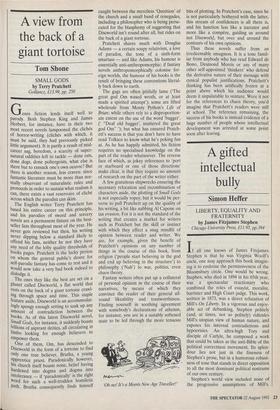A view from the back of a giant tortoise
Tom Shone
SMALL GODS by Terry Pratchett Gollancz, f13.99, pp. 250 Genre fiction lends itself well to parody. Both Stephen King and James Herbert, for instance, have in their two most recent novels lampooned the clichés of horror-writing (clichés with which, it must be said, they had previously picked little argument). It is partly a result of mid- career sag, boredom, a scarcity of super- natural oddities left to tackle — done rats, done dogs, done poltergeists, what else is there but to ransack one's own oeuvre? But there is another reason, less craven: since fantastic literature must be more than nor- mally observant of naturalistic rules and protocols in order to sustain what realism it can, there exists a vast reservoire of cliché across which the parodist can skim.
The English writer Terry Pratchett has based his entire career on this principle, and his parodies of sword and sorcery novels are a permanent fixture on the best- seller lists throughout most of the year. He never gets reviewed but then, his writing never dipping below a standard likely to offend his fans, neither he nor they have any need of the lofty quality thresholds of books pages. Pratchett is the lucky person on whom the general public's desire for self-parodic fantasy has come to rest and it would now take a very bad book indeed to dislodge it.
The ones they like the best are set on a planet called Discworld, a flat world that rests on the back of a giant tortoise crawl- ing through space and time. This staple feature aside, Discworld is an accommodat- ingly spongy enough setting to soak up any amount of contradiction between the books. As of this latest Discworld novel, Small Gods, for instance, it suddenly boasts billions of aspirant deities, all circulating in limbo looking for enough believers to empower them.
One of them, Om, has descended to Discworld in the form of a tortoise to find only one true believer, Brutha, a young apprentice priest. Paradoxically however, his church itself boasts none, belief having hardened into dogma and dogma into intolerance — if 'paradoxically' is the right word for such a well-trodden homiletic Path. Brutha consequently finds himself
caught between the merciless `Quisition' of the church and a small band of renegades, including a philosopher who is being perse- cuted for the blasphemy of suggesting that Discworld isn't round after all, but rides on the back of a giant tortoise.
Pratchett shares much with Douglas Adams — a certain soupy relativism, a love of paradox, the tone of a sixth-form smartass — and like Adams, his humour is essentially anti-anthropomorphic: if fantasy novels anthropomorphically colonise for- eign worlds, the humour of his books is the result of bringing these conventions literal- ly back down to earth.
The gags are often pitifully lame (`The great god Om waxed wroth, or at least made a spirited attempt'); some are lifted wholesale from Monty Python's Life of Brian; while others rely to a disproportion- ate extent on the use of the word 'bugger'. (` "Deaf old bugger', muttered the great god Om" '); but what has ensured Pratch- ett's success is that you don't have to have read Tolkien to know what he's poking fun at. As he has happily admitted, his fiction requires no specialised knowledge on the part of the reader whatsoever. The reverse face of which, as jokey references to 'port or starboard or one of those directions' make clear, is that they require no amount of research on the part of the writer either.
A few gratuitous shipwrecks ensuring the necessary relocation and recombination of characters aside, the plotting of Small Gods is not especially ropey; but it would be per- verse to pull Pratchett up on the quality of his writing, a bit like nabbing Al Capone on tax evasion. For it is not the standard of the writing that creates a market for writers such as Pratchett but the skill or instinct with which they effect a snug mindfit of opinion between reader and writer. We are, for example, given the benefit of Pratchett's opinions on any number of things in the course of this book, from religion (`people start believing in the god and end up believing in the structure') to philosophy (Nah') to war, politics, even chaos theory.
Fantasy writers often put up a collateral of personal opinicin in the course of their narratives, by means of which they convince the reader of their general all- round likeability and trustworthiness. Finding yourself in soothing agreement with somebody's declarations of atheism, for instance, you are in a suitably softened state to be led through the more tenuous 'Oh no! It's a Morris New Age Traveller!' bits of plotting. In Pratchett's case, since he is not particularly bothered with the latter, this stream of confidences is all there is, and his function less like a narrator and more like a compere, guiding us around not Discworld, but over and around the contours of his own opinions.
Thus these novels suffer from an irredeemable smugness. It is a tone famil- iar from anybody who has read Edward de Bono, Desmond Morris or any of many other self-appointed 'thinkers' who defend the derivative nature of their message with cynical populist justifications. Pratchett's thinking has been artifically frozen at a point above which his audience would deem it unpalatable to venture. Were it not for the references to chaos theory, you'd imagine that Pratchett's readers were still at school. The reference remaining, the success of his books is instead evidence of a huge number of people whose intellectual development was arrested at some point soon after leaving.










































 Previous page
Previous page